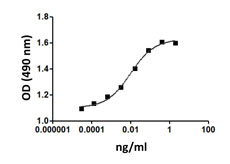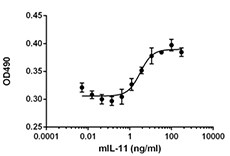- Regulatory Status
- RUO
- Other Names
- Megakaryocyte Colony Stimulating Factor (MKCSF), Myeloproliferative leukemia virus oncogene ligand (Mpl-ligand), Megakaryocyte growth and development factor (MGDF), THPO
- Ave. Rating
- Submit a Review
- Product Citations
- publications
| Cat # | Size | Price | Quantity Check Availability | Save | ||
|---|---|---|---|---|---|---|
| 718102 | 10 µg | $253 | ||||
This product is not available for shipping outside of the United States.
Mouse Thrombopoietin (TPO) is a protein consisting of an N-terminus domain with homology to erythropoietin (EPO) and a C-terminus domain with multiple N-linked and O-linked glycosylation sites. TPO is a key regulator of megakaryocytopoiesis and thrombopoiesis. It signals through the c-mpl receptor and stimulates the proliferation and maturation of megakaryocytes; hence, TPO plays an important role in regulating the level of circulating platelets in vivo. It has also been shown that TPO is able to promote the survival, self-renewal, and expansion of hematopoietic stem cells and primitive multilineage progenitors. Besides its hematopoietic effects, TPO is expressed in the brain where it promotes apoptosis of hypoxia sensitized neurons and inhibits neuronal differentiation by blocking NGF induced signaling.
Product DetailsProduct Details
- Source
- Mouse TPO, amino acids (Ser22-Phe195) (Accession# NP_001166976.1) was expressed in E. coli.
- Molecular Mass
- The 174 amino acid recombinant protein has a predicted molecular mass of 18.7 kD. The predicted N-terminal amino acid is Ser.
- Purity
- >98%, as determined by Coomassie stained SDS-PAGE and HPLC analysis.
- Formulation
- Lyophilized, carrier-free.
- Endotoxin Level
- Less than 0.1 ng per µg of protein.
- Storage & Handling
- Unopened vial can be stored at -20°C or -70°C. For maximum results, quick spin vial prior to opening. Reconstitute in water to a concentration of ≤0.5mg/ml. Do not vortex. It is recommended to further dilute in a buffer, such as 5% Trehalose, and store working aliquots at -20°C to -80°C. Avoid repeated freeze/thaw cycles.
- Activity
- The expected ED50 is ≤ 1 ng/ml, corresponding to a specific activity of ≥ 1 x 106 units/mg, as determined by the dose-dependent stimulation of the proliferation of human MO7e cells.
- Application
-
Bioassay
- Application Notes
-
This product is reactive with mouse and human.
Antigen Details
- Structure
- Cytokine
- Distribution
- TPO is produced by liver and kidney.
- Function
- TPO regulates megakaryocytopoiesis and thrombopoiesis.
- Cell Type
- Mesenchymal Stem Cells, Hematopoietic stem and progenitors, Embryonic Stem Cells
- Biology Area
- Apoptosis/Tumor Suppressors/Cell Death, Cell Biology, Stem Cells
- Molecular Family
- Growth Factors, Cytokines/Chemokines
- Antigen References
-
1. Fitzgerald K, et al. Eds. 2001. The Cytokine FactsBook. Academic Press San Diego.
2. Beutler B, et al. 1988. Annu. Rev. Biochem. 57:505.
3. Beutler B, et al. 1989. Annu. Rev. Immunol. 7:625.
4. Tracey K, et al. 1993. Crit. Care Med. 21:S415. - Gene ID
- 21832 View all products for this Gene ID
- UniProt
- View information about Thrombopoietin on UniProt.org
Related FAQs
- Why choose BioLegend recombinant proteins?
-
• Each lot of product is quality-tested for bioactivity as indicated on the data sheet.
• Greater than 95% Purity or higher, tested on every lot of product.
• 100% Satisfaction Guarantee for quality performance, stability, and consistency.
• Ready-to-use liquid format saves time and reduces challenges associated with reconstitution.
• Bulk and customization available. Contact us.
• Learn more about our Recombinant Proteins. - How does the activity of your recombinant proteins compare to competitors?
-
We quality control each and every lot of recombinant protein. Not only do we check its bioactivity, but we also compare it against other commercially available recombinant proteins. We make sure each recombinant protein’s activity is at least as good as or better than the competition’s. In order to provide you with the best possible product, we ensure that our testing process is rigorous and thorough. If you’re curious and eager to make the switch to BioLegend recombinants, contact your sales representative today!
- What is the specific activity or ED50 of my recombinant protein?
-
The specific activity range of the protein is indicated on the product datasheets. Because the exact activity values on a per unit basis can largely fluctuate depending on a number of factors, including the nature of the assay, cell density, age of cells/passage number, culture media used, and end user technique, the specific activity is best defined as a range and we guarantee the specific activity of all our lots will be within the range indicated on the datasheet. Please note this only applies to recombinants labeled for use in bioassays. ELISA standard recombinant proteins are not recommended for bioassay usage as they are not tested for these applications.
- Have your recombinants been tested for stability?
-
Our testing shows that the recombinant proteins are able to withstand room temperature for a week without losing activity. In addition the recombinant proteins were also found to withstand four cycles of freeze and thaw without losing activity.
- Does specific activity of a recombinant protein vary between lots?
-
Specific activity will vary for each lot and for the type of experiment that is done to validate it, but all passed lots will have activity within the established ED50 range for the product and we guarantee that our products will have lot-to-lot consistency. Please conduct an experiment-specific validation to find the optimal ED50 for your system.
- How do you convert activity as an ED50 in ng/ml to a specific activity in Units/mg?
-
Use formula Specific activity (Units/mg) = 10^6/ ED50 (ng/mL)

 Login/Register
Login/Register 












Follow Us